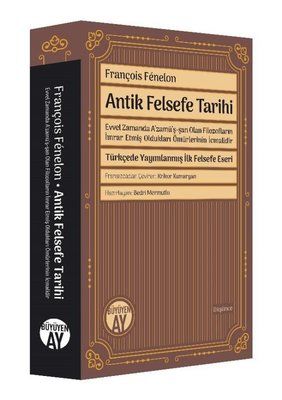
Headscarf-The New Frontier of the Borderless World
(0) Comment - 0 Point
Category
Author
Stock
100 Piece
Stock code
PX0000018331
stock status
in stock
Publishers
Price
25,98 USD + VAT
*starting from 3,90 USD!
%20 discount
25,98 USD
20,78 USD
History of Ancient Philosophy Book Description It was not surprising that we started to be interested again in Western philosophy, to which we were almost indifferent for many centuries, in the post-Tanzimat years. After politics turned to the West, the face of thought would also turn to the West. The first thing that comes to mind in Western thought is ancient philosophy, or more accurately, ancient philosophers, and the life stories and texts of these philosophers gradually began to appear in the press world. Although interest in Western philosophy in Turkey has undoubtedly come a long way in the twentieth century, works on ancient philosophy have continued to be written and published through copyright or translation. This interest has not diminished in the Western world either. In a sense, subsequent philosophers and philosophies that emerged over more than two thousand years have not aged ancient philosophy. In Turkey, for example, the works of Walther Kranz, Antony Kenny, Julia Annas, Wilhelm Capelle and the basic work of Diogenes Laertios on this subject have been translated and many copyrights have been made. The feature and priority of this book is that it is the first of such publications in Turkey. This work, translated from French and published in 1854, is the translation of François Fénelona's book Abrégé de La Vie des Plus Illustres Philosophes de LAntiquité, under the title It is a Summary of the Lives of the Philosophers Who Were Diminished in the Past. The translator is an Ottoman citizen named Krikor Kumaryan, who is understood to be Armenian, but we have no information about him. While Münif Pasha's Muhaverat-ı Hikemiye is accepted as the first contemporary translation of ancient philosophy, on the contrary, it is understood that Krikor Kumaryan's translation is the first and most comprehensive work on this subject. Krikor Kumaryan's translation has a unique place in terms of translation language, in addition to its priority in terms of seniority over other books on ancient philosophers available in Turkish. Kumaryan's Turkish is the Turkish of an Armenian from that period. In this respect, we did not find it appropriate to correct the language of the work, which is one of the limited examples in our written language, and chose to leave it as it is. While the book was being printed, with the advice of Ali Pasha, the pages were printed facing each other in French and Turkish. However, we again printed the old text and new text pages in the original edition facing each other, but this time we neglected the French text. Although paragraphs and punctuation marks were not used in the Turkish text in the original edition (this was a feature of those years), paragraphs and punctuation marks were implemented in the new text as applied in the French text. (From the Promotional Bulletin)
| Publisher | : | Büyükyenay Publications |
| Number of pages | : | 432 |
| Publication Year | : | 2021 |
| ISBN | : | 9786057683151 |
| The heart | : | Turkish |
Be the first to review this product!
İyi beğendim
pratik cocuk etkinlikleri | 18/09/2025
İyi güzel
pratik cocuk etkinlikleri | 18/09/2025
Sitenizi çok beğeniyorum. Başarılar
S... A... | 29/07/2025
Ömer Aksoy | 25/07/2025
Kovareke giranbiha
O... K... | 30/05/2025
Kürtler için yapılmış güzel şeylerden bir tanesi
M... A... | 16/04/2025
siparişler hızlıca ulaşıyor, kategori çok. beğendim.
A... U... | 05/04/2025
Sizlerden gayet memnunum emeğinize sağlık
M... A... | 12/03/2025
Harikaydı
Serdar KÖMÜRCÜ | 22/01/2025
Gayet pratik ve hoş
Muzaffer Bora | 12/01/2025


